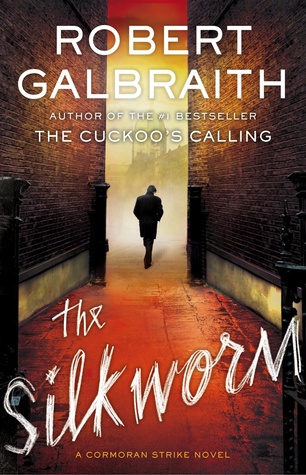Hard to remember these days that there was a time you had to wait for the ink and paper reviews to see your work excoriated. With the invention of the internet, any subliterate cretin can be Michiko Kakutani.I hadn't heard of Michiko Kakutani before, but as I am at minimum a subliterate cretin with an internet connection, I discovered her smackdown of J. K. Rowling (did NY Times book critic Kakutani actually kill Harry Potter?), and this tempest in a teapot is wonderfully illustrative of the strange territory in which Rowling (or, if one prefers, Robert Galbraith) set her second murder mystery: in the elite, rarefied and backbiting literary community of London, England. Quite aside from the mystery and its solution, The Silkworm reads like a settling of scores (which is, of course, ironic because it's about a book whose intent is to settle scores among the literary community) and one needs only to read the most popular quotes on goodreads to get the tone:
“The whole world's writing novels, but nobody's reading them.”In addition to making unflattering characterizations of editors, publishers, agents, and authors, there is also much ink here about the snobbery of those authors who write capital-l Literature (you know, those who get invites to the Booker dinners) and the dismissal of those who merely write popular fiction. By sharing the majority of the plot of the very Literary book-within-the-book, Bombyx Mori, Rowling was able to skewer the pomposity of such a work with the snobbish authors' own weapons: dense allegory, metaphors, and literary allusions that don't add up to much at all. I had to repeatedly squint to avoid eye damage from the sparks flying off the sharpening axe.
“...writers are a savage breed, Mr. Strike. If you want life-long friendship and selfless camaraderie, join the army and learn to kill. If you want a lifetime of temporary alliances with peers who will glory in your every failure, write novels.”
“We need readers,” muttered Daniel Chard. “More readers. Fewer writers.”
But happily, Rowling/Galbraith has written a compelling mystery. The murder is gruesome, there's a large cast of plausible suspects, and even though the most damaging evidence is given straight to the reader fairly early on, I hadn't solved it before the reveal (and like in all the best mysteries, I didn't feel cheated -- the solution wasn't hidden from me, just shuffled in with the mass of extraneous evidence). If The Silkworm had been just about the murder and the detective work that led to the murderer, I would have been much more satisfied, but…
Once again, I found that there was just too much backstory for Cormoran Strike and Robin Ellacott -- and while these are two characters that I find really interesting, I just want less of the melodrama of their personal lives (has Strike finally gotten over his long-term relationship with former fiancée Charlotte? Will Matthew ever approve of Robin's job? Tune in next week…) I also found it too convenient that The Silkworm introduced a number of Strike's old friends; people who can be called upon to run errands and pull strings (and advance the plot…) And I was downright annoyed when, nearing the end of the book, Strike told Robin his theory of the crime (without telling the reader) and then I had to follow along helplessly as they re-interviewed people onstage and collected evidence offstage -- evidence that wasn't revealed until the final chapter. What I did like was the way that Robin played a more central role in the detective work this time and her relationship with Strike hits just the right note of professional camaraderie -- I sincerely hope that Rowling is never tempted to start a romance between them (but, I suppose that as with Harry and Hermione, she's proven before that she can write platonic intergender friendships).
In the end, The Silkworm feels a bit bloated and written to fulfill some revenge agenda of Rowling's own. As with The Cuckoo's Calling, I'm not 100% certain that this book would have been a bestseller without the J. K. Rowling name attached, but despite my tepid reaction to this series so far, that name is enough to keep me interested.
"Why?" asked Strike heavily.
"Why what?" said Robin, looking up at him.
"Why do people do this?"
"Blog, you mean? I don't know...didn't someone once say the unexamined life isn't worth living?"
"Yeah, Plato," said Strike, "but this isn't examining a life, it's exhibiting it."
Okay, so I'll never be Michiko Kakutani, but in this exchange, Rowling takes a swipe at readers like me, too. If this is exhibitionism, I guess I need to own it.


